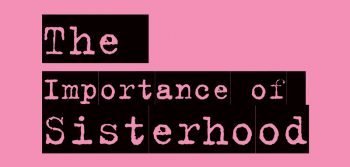
Traumatic True Stories: When She Breaks Your Heart
Breaking up is hard to do. This is a fact of life. Traditionally, romantic breakups have received the bulk of attention in novels, movies and often in the discussions of our day-to-day lives. Why is that?
The relationships that women develop with each other are incredibly significant and fundamental to the development of healthy self-esteem and a sense of self. So what happens when women "break up"?
ANOKHI interviewed three very different women with three very different experiences to find out why breaking up with your girlfriends can be far worse than losing a romantic partner.
Samira & Jaya: Betrayal and Isolation
A serious violation of trust is enough to end any relationship, but when the betrayal comes from a best friend, the effects can be traumatic and long-lasting.
Samira and Jaya had been friends for over five years when Jaya committed one of the worst forms of betrayal by sleeping with Samira's partner and father of her two children.
"I woke up one night and heard them fighting in my living room. Jaya was crying, and I immediately suspected I had been betrayed," Samira says. "However, they refused to explain what was happening. The next day Jaya came to me and confessed."
The women's friendship ended shortly thereafter, when Samira sat down with the woman she had been so close with to express her intense feelings of anger, hurt and confusion. "Losing Jaya was incredibly hard because I had few friends at that point in my life," Samira explains.
Samira admits that she has been very jaded by this experience. "I learned not to place my trust in just anyone," she says, and admitted that though she does not think of Jaya on a regular basis, when she does, it is only in a very negative light.
"Holding onto really negative emotions in the long term can certainly have terrible repercussions, even physiological effects," says Jennifer Coleman, a counsellor at Wilfrid Laurier with a master's degree in social work. "Feeling very negative about someone can have certain kinds of health effects essentially."
Unable to find herself again, Samira sought help through counselling, though she now feels that the biggest help to her self-esteem and happiness came from building healthy relationships with good people.
Women's social networks are immense sources of support and play an important role in promoting a healthy self-image, according to Coleman. Samira experienced an extremely damaging breakup that was made all the more terrible by her lack of other close friends and the betrayal of her partner.
Lalita & Michelle: Jealousy will tear you apart Lalita and Michelle met when they were in their first year of university. They grew close quickly, and developed a large group of close female friends. Eventually Lalita and Michelle moved in together with three other very close girlfriends.
Lalita's living situation for the first two years was fairly ideal, she says. She felt very close to her roommates and called many of them her best friends.
Sisterhood of this nature can been understood much in the same way pop culture and media has constructed the sisterhood on film, according to Dr. Lorraine Vander Hoef, professor of women's studies at Wilfrid Laurier University. "It can been seen as spiritual-there is a real bond there. When you are in the presence of these women, you feel stronger to go out into the world", she explains.
This type of sisterhood was like the one Lalita shared with her roommates until jealousy and possessiveness entered the equation.
After living with Michelle and their mutual friends for over two years, Lalita began dating someone new. Lalita was also actively building her career in journalism at the time and found herself at home less and less. "Jealousy tore us apart," she explains. "The group definitely grew to resent me for not being around as much, especially Michelle. She was one of those people who always needed to be with someone, and since we were so close, when I stopped coming home all the time she became really resentful."
The tension surrounding Lalita and Michelle's relationship carried on for a period of time, until everything came to a breaking point.
"One night we got in this huge fight after the bar, and then it kept happening to the point where Michelle and I were just not even friends," says Lalita.
Michelle's feelings, though not productive, were not all that unusual, says Coleman. "Anger is a part of the pain process. Being angry and holding a grudge is a common response to being hurt."
Unfortunately for Lalita, she had signed a lease and was committed to spending the rest of the year in a house that was quickly becoming divided by her and Michelle's breakup.
The three other women living in the house began to gravitate to specific sides. One of Lalita's other very close friends, Jessica, made the choice to side with Michelle, something Lalita admits was very difficult to deal with. "I lost my two best friends from university because of the breakup," Lalita says. "I was pushed to become very close with my friends at work. Thank goodness I had already developed a separate social circle."
Unfortunately, when women have fallouts, it is common for one or both of them to attempt to isolate the other, or campaign for more support from mutual friends. "A major aspect of how women deal with disagreements has to do with disrupting relationships," Coleman explains. "Ostracizing people, and using relationships as a source of punishment, you see this less with men. Rallying friendship and support can be a defense."
Lalita admits that although romantic breakups have been harder on her in the short term, she has found the long-term effects of her friendship breakup to be much worse.
Today, she feels that she is more capable of recognizing unhealthy friendships, and avoiding the pain that can be caused when friends get jealous and possessive.
Deepika & Poonam: Priority Shift
Deepika and Poonam had been friends for four years and roommates for three.
"We were inseparable," Deepika explains. When these two best friends moved into separate homes after graduation, it became apparent to Deepika that Poonam was no longer interested in maintaining their close bond. "Slowly but surely (Poonam) started cancelling on our plans, and then one night when she didn't show up for a very important dinner, I decided that was it."
Losing a friend of four years is not something one adjusts to quickly, and often one has to cope with more than the loss of their friend. "It can be very painful to lose a relationship that you still value," Coleman says. "Anxiety and fear of finding and building new relationships is common and it can be hard to feel safe in new relationships."
Deepika certainly noticed the void that the breakup with Poonam left in her life, as well as the lasting emotional damage. "It is very heartbreaking when you expect to have that person in your life forever and then to have them ignore you and not put any effort into the relationship, that is very painful," she explains.
Her breakup with Poonam also caused significant damage to her self-confidence. "You start to question yourself and you question how you are with your other friends. I started evaluating all of my other relationships. For some reason I thought it was my fault."
Deepika also admits that she was concerned about how others might evaluate the situation. "It can be hard to explain to your family that your best friend won't be coming around anymore. It was surprisingly embarrassing. I felt like my family might be thinking, 'What did she do, how did she screw this up?'"
Today, Deepika is trying to come to terms with the shocking loss of her friend. After dealing with confusion, sadness and a lower self-confidence, she has found support in her other close friends.
Deepika doesn't exclude the possibility of one day mending the break in her and Poonam's relationship.
Why we need each other
The lasting effects of the losses experienced by Lalita, Samira and Deepika remind us of how traumatic it can be to lose those who are closest to us. All too often, women place their romantic relationships ahead of their friendships, undervaluing the female friends that give them confidence and security. As Jennifer Coleman explains, female friendships are important to the development of healthy social networks and healthy self-perceptions. Similarly, Dr. Lorraine Vander Hoef emphasizes the role that sisterhood plays in the empowerment of women in a society that is so often dominated by men. It is important to appreciate platonic friends, because more often than not, they are the ones we lean on most.
BY: SHANNON BUSTA / PUBLISHED: MARCH/APRIL 2010 ISSUE














































































































